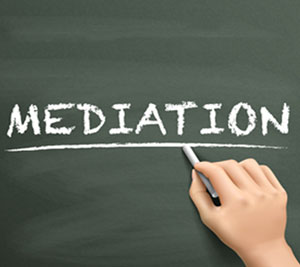family law mediation - only $935 per party

What is Family Dispute Resolution?
Family Dispute Resolution (‘FDR’) is a mediation process whereby parties involved in a family law dispute attempt to resolve that dispute outside of court proceedings with the assistance of an independent Family Dispute Resolution practitioner.
Our Principal, Dean Bainbridge, has been accredited by the Commonwealth Attorney General's Department as a Family Dispute Resolution Practitioner and is therefore qualified to issue FDR certificates pursuant to section 60i of the Family Law Act. The cost for Dean Bainbridge to act as a Family Dispute Resolution mediator is $935 per party (inclusive of GST), for up to a full day. Call us today to arrange your mediation event.
Family Dispute Resolution explained
How do I organise a mediation?
The first step is for one party to call us on 1300 148 110. Once we have been engaged, we will have a discussion with both sides to find a date and time that is convenient to everyone for the mediation to run. Once both parties have confirmed their availability, we will conduct individual intake interviews over the phone to gather the necessary background information about the issues in dispute. During this intake process, we will also explain the process in more detail and answer any questions.
Where is the mediation conducted?
The parties have a number of options as to how they want to the mediation to proceed. Many people prefer mediations to be conducted via video conferencing software such as Zoom or Microsoft Teams. This allows both parties to participate from the comfort of their own home or their lawyer's office, without having to be in physical proximity to the other party. For those who prefer face to face mediation, We also offer free use of our mediation rooms in either our Blacktown or Parramatta offices. This also comes with light catering at no additional cost.

Do I need a lawyer to represent me during FDR?
Legal representation is entirely optional. There is often a significant increase in the prospects of reaching an agreement at mediation when both parties are legally represented, so we do recommend that you have a lawyer with you (or at least available to provide advice over the phone when necessary). This is not mandatory however.
If we reach agreement, will it be legally binding?
We will provide you with a document at the end of mediation that is known as "heads of agreement". This document summarises the nature of the agreement reached in broad terms, but it does not have any legal effect in a formal sense. The terms of the agreement will need to be particularised in consent orders or a financial agreement. The terms of the agreement will become legally enforceable once the consent orders have been approved by the court, or at the time that the binding financial agreement has been properly executed by all parties.
How long does Family Dispute Resolution take?
The fixed fee for mediation covers the entire mediation process, up to a full day of family dispute resolution. In some cases, particularly those involving simple disputes and cooperative parties, agreement can be achieved in around 3 or 4 hours. Most family law mediations, however, require a full day. In cases involving intractable disputes, inflexible or unreasonable participants, or those involving more complex issues, sometimes more than one mediation session is required over multiple days (although thankfully these types of cases are fairly uncommon).

Family Dispute Resolution and parenting matters
The Family Law Act makes it compulsory for all parties to make a genuine effort to resolve a dispute before applying to the court for a parenting order. The court is unable to hear a case where children are involved unless a "s60I certificate" is filed with an initiating application or an exemption applies. We will provide you with a section 60i certificate at the conclusion of FDR, irrespective of whether you reach agreement or not. This mediation certificate is provided at no additional cost.
SECTION 60I CERTIFICATES
What is a s60I certificate?
Section 60I of the Family Law Act 1975 seeks to ensure that all persons who have a dispute about parenting matters make a genuine effort to resolve that dispute by family dispute resolution before going to court. A section 60I certificate typically states that a person has attended upon an FDR practitioner for the purpose of trying to resolve the family law parenting dispute through mediation, or that family dispute resolution is not appropriate. The certificate allows that person to then file an application for parenting orders in either the Family Court of Australia or the Federal Circuit Court.
What does a section 60i certificate say?
A s60I certificate relates to the result of the FDR and can only be issued by an accredited FDR practitioner. The certificate will state one of the following:
The court may take into account the type of certificate that has been issued when making an order and when deciding on possible costs awards.

Are there any exceptions to obtaining a s60I certificate?
There are a number of exceptions to the general requirement to obtain a s60I certificate prior to filing for parenting orders. These include where:
- a) The application is for orders that are to be made with the consent of all the parties or in response to an application made from another party;
- b) There has been family violence or child abuse or there is a risk of family violence or child abuse;
- c) An existing order relating matters involving children has been contravened;
- d) The case is one of urgency; or
- e) One of the parties is unable to participate effectively in FDR because they are incapacitated in some way.
Are the things said in FDR confidential?
Under s10H of the Family Law Act, an FDR practitioner is required to keep everything said in FDR confidential. A FDR practitioner may only disclose these communications if the party who made that communication gives their consent or if the FDR practitioner reasonably believes another person or a child has been, or is at risk of, being harmed.
Is anything said in FDR admissible in court?
Anything said in the presence of a FDR practitioner in FDR is inadmissible in court under s10J of the Family Law Act. The only exceptions are where there has been an admission by a party that a child has been abused or is at risk of being abused or where there is a disclosure by a child that they have been abused or are at risk of being abused.
Family Dispute Resolution and financial matters
The Family Law Rules require all parties involved in a financial dispute to make a genuine effort to resolve that dispute prior to going to court. The court expects that all parties have attempted pre-action procedures prior to filing an initiating application. FDR is one included as one of these pre-action procedures. A party who has not complied with these procedures may have costs penalties awarded against them.
There are certain circumstances in which parties are exempt from following pre-action procedures. These include cases involving urgency, family violence and child abuse, fraud, intractable issues, or where a time limit is close to expiring. Call Bainbridge Legal for local options of mediation near me.
How can Bainbridge Legal help?
Our expert family law team can provide all types of mediation support and advice. Our Principal, Dean Bainbridge, is a qualified mediator and is able to perform the mediation for parties involved in family law disputes. Alternatively, we can provide legal representation for a party who is attending mediation through another provider. Call us today to discuss what we can do for you.